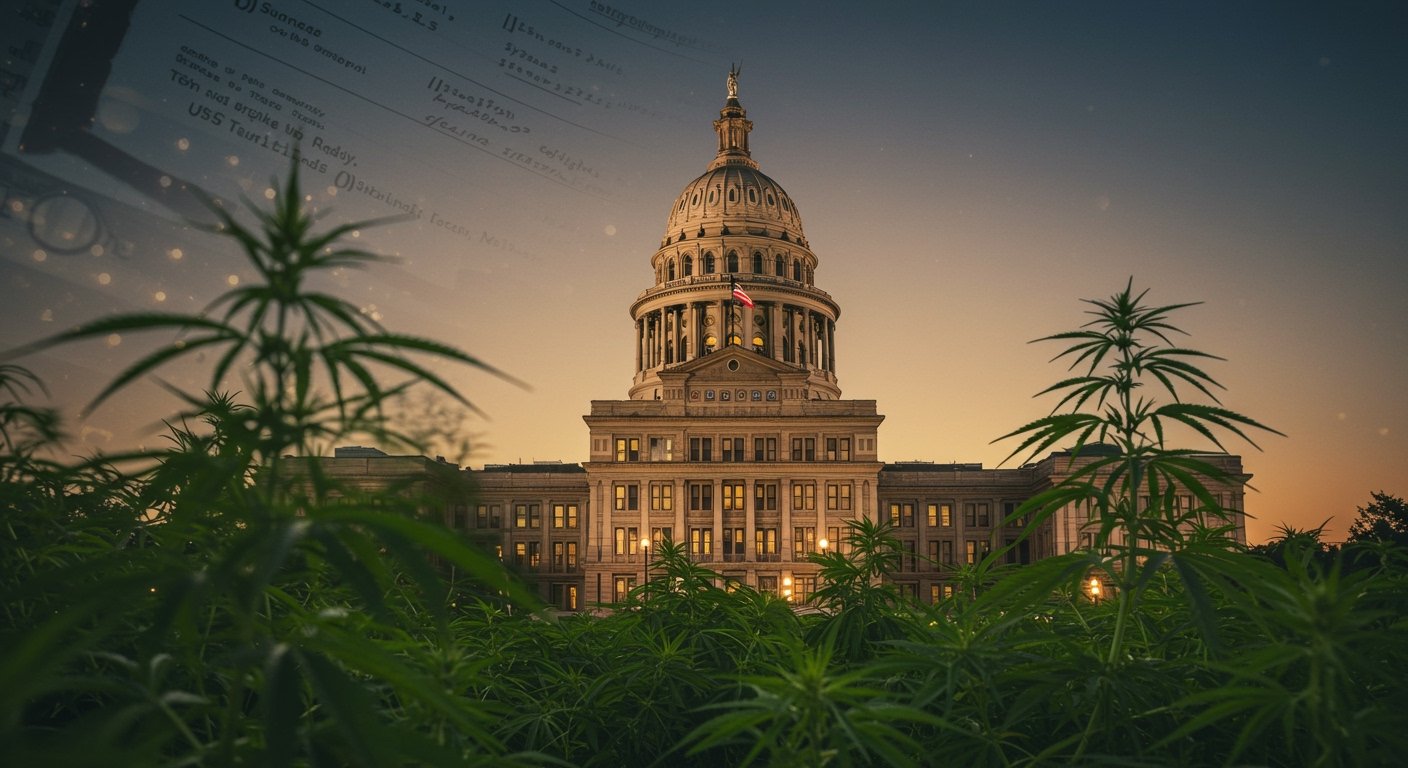AUSTIN, Texas – Governor Greg Abbott of Texas late Sunday night, June 22, 2025, delivered a significant legislative blow to proponents of a stringent ban on consumable THC products by vetoing Senate Bill 3 (SB3).
The veto, issued mere minutes before the statutory deadline, halts a measure that sought to enact a comprehensive, statewide prohibition on goods containing tetrahydrocannabinol (THC) derived from hemp, which have become widely available across the state following federal and state legislative changes.
Governor’s Rationale: Federal Law and Constitutional Concerns
In his veto statement, Governor Abbott articulated several key reasons for rejecting SB3, primarily centering on the intersection of state and federal law and the potential for legal challenges.
“The state cannot criminalize what Congress has legalized under the 2018 federal Farm Bill,” Abbott stated, referencing the federal legislation that legalized hemp and hemp-derived cannabinoids, including certain levels of THC. This assertion underscores the governor’s view that SB3 conflicted directly with federal statute, potentially exposing Texas to legal challenges under the Supremacy Clause of the U.S. Constitution.
Furthermore, Abbott argued that SB3 would likely face significant constitutional challenges in court, which he contended would ultimately “hinder efforts to address public safety issues” related to these products. By pursuing a ban perceived as legally infirm, the state’s ability to implement enforceable regulations and oversight would be undermined, in his estimation.
A Call for Regulation, Not Prohibition
Instead of supporting an outright ban, Governor Abbott is advocating for a framework of stricter regulation for hemp-derived products, proposing a model similar to how alcohol is controlled and taxed in Texas. This approach would involve measures potentially covering manufacturing standards, labeling requirements, age restrictions, and licensing for businesses.
To advance this regulatory agenda, Governor Abbott has formally called for a special legislative session to commence on July 21, 2025. The primary focus of this session, according to the governor’s proclamation, will be to address “consumable hemp regulation,” among other specified bills. This signals a pivot from a punitive prohibition strategy to one aimed at establishing a controlled market under state oversight.
Political Opposition and Accusations
Governor Abbott’s decision drew immediate and sharp criticism from Lieutenant Governor Dan Patrick, who had been a staunch champion of SB3 and the effort to ban consumable THC products.
Lieutenant Governor Patrick publicly accused Governor Abbott of attempting to legalize recreational marijuana in Texas through the proposed regulatory framework. This accusation highlights a deep division within the state’s Republican leadership regarding how to handle the proliferation of hemp-derived products containing THC, with Patrick favoring an outright ban perceived as preventing backdoor marijuana legalization.
Patrick’s opposition suggests that the upcoming special session will likely be marked by intense debate and potential gridlock between those favoring strict prohibition and those, like Abbott, who see regulation as the more viable and constitutionally sound path forward.
Impact on the Thriving Texas Hemp Industry
The veto of SB3 provides a temporary reprieve for the burgeoning Texas hemp industry, which includes cultivators, processors, manufacturers, and retailers of various hemp-derived products, including those containing THC. This industry is conservatively estimated to be worth billions of dollars annually and has seen significant investment and job growth since the passage of the 2018 Farm Bill and subsequent state legislation aligning with it.
An outright ban, as proposed by SB3, would have effectively shuttered many of these businesses, leading to substantial economic disruption, job losses, and potential legal battles over existing inventory and investments.
By vetoing the ban and calling for regulation, Governor Abbott’s action allows the industry to continue operating, albeit under the looming prospect of new, potentially stringent state rules that will be debated in the special session.
The Legislative Landscape and Future
The legislative debate surrounding hemp and THC in Texas has been complex, reflecting national uncertainties and varying state approaches to regulating these products in the wake of federal changes.
The 2018 Farm Bill descheduled hemp, defining it as cannabis with less than 0.3% Delta-9 THC by dry weight. This opened the door for a wide array of products containing other forms of THC (like Delta-8, Delta-10, HHC, etc.) derived from legally grown hemp, even if they can produce intoxicating effects. Texas law has largely mirrored the federal definition, leading to the current market landscape that SB3 sought to overturn.
The upcoming special session, scheduled for July 21, 2025, will be a critical juncture. Lawmakers will face the challenge of crafting regulations that balance public safety concerns, consumer access, and the interests of the established hemp industry, all while navigating the political divide exemplified by the differing views of Governor Abbott and Lieutenant Governor Patrick.
The debate will likely center on issues such as defining what constitutes a “consumable hemp product,” setting maximum potency limits for various cannabinoids, establishing testing and labeling requirements, implementing age gates for purchasing, and developing a licensing and enforcement mechanism. The outcome of these discussions will shape the future of the multi-billion-dollar Texas hemp market for years to come.
Conclusion
Governor Greg Abbott’s veto of Senate Bill 3 marks a decisive turn away from prohibition and towards a regulatory approach for consumable THC products in Texas. Citing conflicts with federal law and likely constitutional challenges, the governor has set the stage for a special legislative session beginning July 21, 2025, dedicated to establishing a framework for stricter regulation.
This decision, while welcomed by the state’s significant hemp industry, pits the governor against key legislative leaders like Lieutenant Governor Dan Patrick, who favors an outright ban. The upcoming session is expected to be contentious as lawmakers grapple with the complexities of regulating a rapidly evolving market while balancing public health, economic interests, and differing political philosophies.






